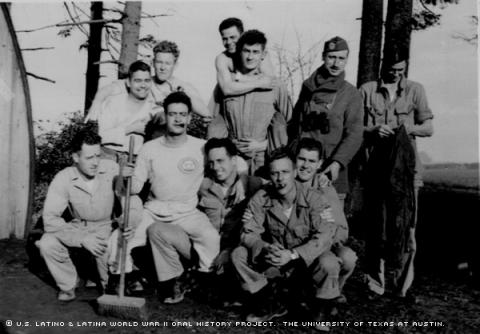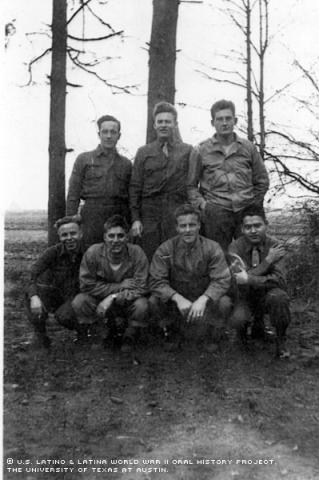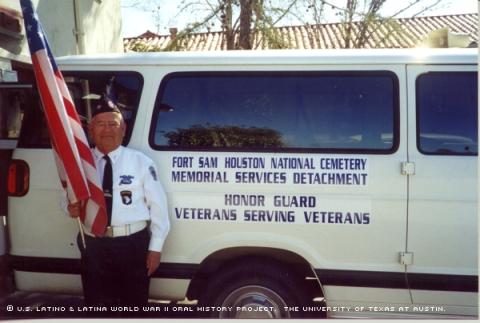


By David R Zavala
On his initial night of fighting in World War II Europe, Domingo Cantu landed for his first mission, and was unable to free himself from his parachute. As he struggled and tugged to get the chute off, he heard the blasts of enemy fire.
Cantu didn’t panic. He grabbed his knife and cut the chute off. It was in this first battle that Cantu knew he was in for a difficult time and that the war would change his life. His service to his country continued many years after the war was over.
Cantu's mother, Anastasia Segura Cantu, passed away when he was only three months old in Mexico; his father, Porfirio Cantu, soon took the family to America.
"I was 1 year old when I came to this side," Cantu said.
Porfirio worked as a painter and remarried. The family lived in San Antonio. At an early age, Cantu was already working, traveling to ranches with his family and performing jobs like stocking groceries and helping his father paint houses.
"It wasn't like now, wherever you are you put the kids in school," Cantu said. "At that time, you had to work."
The necessity of working impeded the education of Cantu, who attended school through 5th grade, most of it at Stephen F. Austin Elementary in San Antonio. As a teenager, Cantu continued to work. He labored in sugar beet fields in Minnesota, and sold groceries and vegetables in small Texas towns in the Uvalde area, south of San Antonio.
In 1943, Cantu was drafted by the U.S. Army to serve in World War II. He was sent to Little Rock, Ark., where he was originally going to be trained as a medic. However, a group of paratroopers stopped by to recruit one day, and Cantu answered the call and subsequently underwent special training.
"We didn't have rifles out there in the medics," he said.
On Oct. 4, 1943, Cantu arrived in Europe as part of Company I, 502nd Parachute Infantry Regiment, 101st Airborne Division. Among battles fought, Cantu was at Normandy for the D-Day invasion at dawn on June 6, 1944. It’s in this battle that he was initially wounded.
"The first time, a bullet went right through my leg," he said.
Among other battles fought, Cantu was in a campaign in Northern France, and a campaign in Rhineland, located in Germany.
Cantu was wounded a second time during a fight in Belgium when he was struck by an artillery shell.
"I had a whole bunch of shrapnel all over me," he said.
Two months after he was wounded a second time, the war was over. Cantu was in Paris when he found out Germany had surrendered. The military gave him an honorable discharge at Camp Fannin in East Texas.
Among the more prestigious awards Cantu earned were the EAME Campaign Medal with three bronze stars, two Purple Hearts and the Distinguished Unit Badge. He also won the Bronze Star Medal, Combat Infantryman's Badge and Airborne Wings with at last one combat jump star.
A few short months after his return, Cantu married. He’d met Rose Flores while working in a grocery store in 1941, and they corresponded by letter while Cantu was in England. The couple later had two daughters.
Cantu continued to work with his uncle and father painting houses. Then, in 1951, he was hired by the San Antonio public transportation company, Via, as a bus driver. He would drive a bus for 32 years before retiring.
Many years after the war was over, Cantu continued to serve his country and the military. He did this by participating in war veteran organizations. Cantu is known for his work with the San Antonio chapter of Veterans of Foreign Wars of the United States. He’s also part of the Military Order of the Purple Heart, whose members visit veterans’ hospitals, among other activities, and the Alamo Silver Wings Airborne Association, a group that includes airborne divisions from the U.S. Marines, U.S. Navy, U.S. Army, U.S. Air Force, U.S. Coast Guard, the Texas National Guard and the Texas State Guard.
On June 8, 2001, Cantu received awards in recognition of his work with the VFW. Carlos I. Uresti of the Texas House of Representatives also recognized Cantu for his work with VFW. Cantu received certificates for his hours served in VFW post 9186, and for the hours volunteered at Fort Sam Houston National Cemetery.
Mr. Cantu was interviewed in San Antonio, Texas, on Oct. 13, 2001, by Antonio Cantú, no relation to Cantu.

